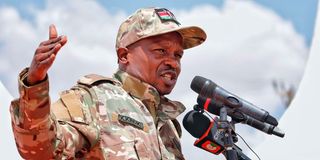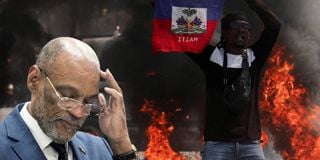CS Kindiki: No turning back on police deployment to Haiti

Interior Cabinet Secretary Kithure Kindiki.
What you need to know:
- The exact date on which the National Police Service (NPS) officers will leave the country remains unknown.
- The secretary of the Haitian National Police Union (SPNH-17), Mr Jean Baptiste, told the Nation in an exclusive interview that the police chiefs in Haiti should be thrown out with immediate effect.
The Kenyan government has maintained that despite all the violence in Haiti, Kenya's elite police officers will soon be heading there.
Interior Cabinet Secretary (CS) Kithure Kindiki said on Monday that all is set and 1,000 police officers will be sent to the Caribbean nation to restore peace.
The Kenyan officers will be deployed to Haiti as part of a United Nations (UN) sponsored security mission.
"We are now in the pre-deployment phase. All the other programmes are in place including the Status of Forces Agreement and the arrest and detention laws and other enforcement measures are now in place," Prof Kindiki said in Machakos County.
The Nation understands that the police officers have been taken through standard operations on how they will operate in Haiti. Of the 1,000 officers, none are female.
According to the CS, the government had already complied with a court order stopping the deployment of the officers to Haiti.
Kenya seems to be the only country that is boldly talking about sending its officers to the war-torn country.
President William Ruto has already agreed with Haiti's Prime Minister Ariel Henry to send officers to the Caribbean nation.
But on Monday, Prof Kindiki said Kenya was only part of a multinational security mission in Haiti.
"Kenya is the lead nation but there are so many other nations that have pledged to contribute their troops. It is part of our international commitment," the CS said.
The UN and the United States of America (USA) have already expressed concern over the delay in sending Kenyan officers to Haiti.
While urging Kenya to send its officers to Haiti, the US has asked all its citizens to leave the war-torn country.
Similarly, President Ruto struck a deal with the Haitian Prime Minister at State House a week ago, but the latter has found it difficult to access the country he rules.

A demonstrator holds up a Haitian flag during a protest against Prime Minister Ariel Henry's government and insecurity, in Port-au-Prince, Haiti March 1, 2024. (Inset) Haitian Prime Minister Ariel Henry.
There are currently calls from some political leaders and officers in Haiti for the police chiefs to step down.
The secretary of the Haitian National Police Union (SPNH-17), Mr Jean Baptiste, told the Nation in an exclusive interview that the police chiefs in Haiti should be thrown out with immediate effect.
"There must be a change of leadership within the Haitian National Police, denouncing the alleged incompetence of the top leadership," he said.
Mr Baptiste said they were calling for the appointment of an operational and dynamic Director General who would be able to restore the confidence of the police and also put in place an effective plan to combat insecurity.
He said he feared that if things continued as they were, many lives would be lost.
"More than 10 police stations and two detention centres have been attacked, resulting in the escape of more than 5,000 prisoners," he said.
"The population is almost left to fend for itself, with political leaders seemingly absent and police forces disarmed and powerless in the face of increasing violence," he added.
This was echoed by Gideon Jean of the Centre for Analysis and Research in Human Rights (CARDH) in Haiti, who said the situation was worsening.
Mr Jean said Haitians appreciated the contribution Kenya was making, especially in agreeing to send its officers to the war-torn country.
But he said police officers in Haiti did not have modern equipment to deal with the deadly gangs now running the show in Haiti.
"The situation in Haiti has deteriorated exponentially. Today, the capital is under the control of gangs. The critical infrastructure of the state is under attack and police officers are absent," he said, adding that airports, police stations and prisons are currently controlled by gangs.
Mr Jean went on to say that police officers in the Caribbean country had become victims of kidnapping, rape and murder.
Also Read: Gang fights, demonstrations rock Haiti
He said it was necessary to use proportional force with the necessary material and technological means, otherwise the situation would get worse in the coming days.
According to him, 1000 policemen from Kenya could not cope with the situation as the country needed a force capable of assisting the Haitian National Police to carry out operations to protect the population and infrastructure of the Caribbean nation.
He said police officers in Haiti should be provided with heavy equipment, weapons, ammunition, bulletproof vests and ballistic helmets, which they currently lack.
According to him, the security problem in Haiti is not a question of the number of police officers.
"We would be happy to have the support of our African brothers, but in this situation the international policy behind it will not really help to solve the problem," he said, adding that foreigners alone will not be able to do anything.
The exact date on which the National Police Service (NPS) officers will leave the country remains unknown, although President William Ruto said the government was ready to deploy them.

President Ruto and Haiti PM Ariel Henry witnessed the signing ceremony in State House Nairobi.
But Mr Jimmy Cherizier, alias Barbeque, a powerful gang leader, has warned Kenyan officers not to set foot in Haiti.






